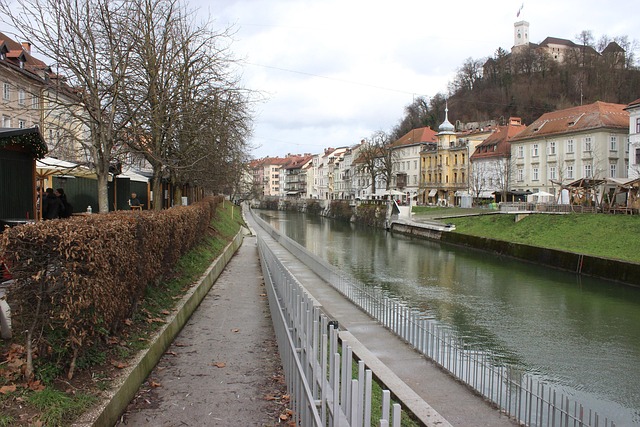Karachi's Shahra-e-Qaideen, Pakistan's premier banking district, has witnessed significant transformation aligned with the city's economic growth. Once attracting banks due to its strategic location and industrialization, it now boasts a diverse range of financial institutions offering innovative services like digital platforms and competitive interest rates. This hub promotes financial inclusion, fuels local business activities, and fosters economic prosperity in Karachi. Despite challenges such as competition from digital lenders and regulatory shifts, Shahra-e-Qaideen's future appears bright, driven by Karachi's status as Pakistan's primary financial center and its potential for expansion in digital banking services.
Karachi, Pakistan’s bustling financial metropolis, has witnessed a remarkable evolution in its banking sector. This article explores the historical rise of banks in the city and delves into the significance of Shahra-e-Qaideen—a prominent financial district. We uncover the key features and services provided by these institutions, their impact on Karachi’s economic landscape, and future prospects amidst challenges. By examining these aspects, we gain insights into the vital role banks play in shaping the economic destiny of this vibrant city.
- The Rise of Banks in Karachi: A Historical Perspective
- Shahra-e-Qaideen: Understanding the Financial Hub
- Key Features and Services Offered by These Banks
- Impact on Karachi's Economic Landscape
- Future Prospects and Challenges for Banks in Karachi's Shahra-e-Qaideen
The Rise of Banks in Karachi: A Historical Perspective

The banking sector in Karachi, known as Shahra-e-Qaideen, has witnessed a remarkable evolution over the years, reflecting the city’s dynamic economic landscape. Historically, Karachi, as Pakistan’s financial hub, saw an influx of banks during its early development, establishing itself as a bustling commercial center. This growth was fueled by the country’s rapid industrialization and increasing trade activities, particularly along the Arabian Sea. The city’s strategic location became a magnet for financial institutions, attracting both local and international banks.
The rise of Karachi as a banking powerhouse can be traced back to the post-independence era when various nationalized banks were established to cater to the region’s growing financial needs. Over time, the city welcomed foreign bank branches, fostering an inclusive environment that promoted economic growth. Today, Karachi boasts a diverse range of banks, offering a wide array of services, and continues to shape Pakistan’s financial landscape.
Shahra-e-Qaideen: Understanding the Financial Hub

Shahra-e-Qaideen, located in the heart of Karachi, is a financial hub that plays a pivotal role in the city’s economic landscape. This bustling area is known for its dense concentration of banks, financial institutions, and corporate offices, making it a central point for all financial activities in one of Pakistan’s largest cities. The street itself is a testament to the metropolis’s dynamism, with a mix of traditional and modern architecture housing some of the country’s most prominent financial brands.
In terms of significance, Shahra-e-Qaideen facilitates seamless access to various banking services for residents and businesses alike. From commercial banks offering corporate solutions to small-scale finance providers catering to individual needs, the area provides a comprehensive range of financial options. Moreover, its strategic location in Karachi, a bustling economic center, ensures that this financial hub remains a vital component of the city’s ever-evolving financial tapestry.
Key Features and Services Offered by These Banks

In the vibrant city of Karachi, banks like Shahra-e-Qaideen have emerged as pivotal financial institutions, offering a suite of services tailored to meet the diverse needs of their customers. These banks stand out for their commitment to innovation and accessibility, making quality banking services available across the metropolis. Key features include state-of-the-art digital platforms that enable seamless online transactions, mobile banking apps for on-the-go access, and advanced security measures ensuring safety and peace of mind for users.
Services rendered by these institutions encompass a wide range, from traditional savings and current accounts to specialized business banking solutions. They facilitate easy remittances, both local and international, and offer competitive interest rates on deposits. Additionally, Shahra-e-Qaideen banks provide tailored loan packages, including mortgages, car loans, and personal loans, to cater to various financial aspirations. Their focus on customer satisfaction is evident through the provision of efficient customer support services, accessible branches, and comprehensive digital banking experiences.
Impact on Karachi's Economic Landscape

The development and expansion of Shahra-e-Qaideen, a strategic initiative focusing on financial inclusion, have had a profound impact on Karachi’s economic landscape. By enhancing access to banking services, particularly for underserved communities, this project has contributed to a more vibrant and inclusive local economy. The introduction of modern banking facilities in areas previously lacking such infrastructure has facilitated increased business activities, supported local entrepreneurs, and promoted overall economic growth within the city.
Karachi, known as Pakistan’s financial hub, has benefited from this initiative through better-connected financial networks that encourage investment, trade, and job creation. The enhanced economic activity resulting from these changes ripples throughout the metropolis, fostering a more dynamic and prosperous environment for all residents.
Future Prospects and Challenges for Banks in Karachi's Shahra-e-Qaideen

The future prospects for banks in Karachi’s Shahra-e-Qaideen are promising, driven by the city’s rapid economic growth and its position as a major financial hub in Pakistan. The area is home to numerous businesses, startups, and financial institutions, creating a conducive environment for expansion. With an increasing demand for digital banking services, traditional banks have the opportunity to enhance their online presence and mobile banking platforms to cater to the tech-savvy population of Shahra-e-Qaideen. Moreover, the introduction of innovative financial products and services tailored to local businesses and entrepreneurs can foster economic development in the region.
However, challenges remain. Karachi’s dense population and traffic congestion present logistical hurdles for banks aiming to establish a physical presence. Competing with digital-only lenders and fintech startups for market share is another significant challenge. Additionally, ensuring robust cybersecurity measures while embracing digital transformation is crucial to protect customer data and maintain trust. Banks must also navigate regulatory changes and adapt to evolving financial landscapes to stay competitive in the dynamic Karachi market.
Karachi’s Shahra-e-Qaideen has emerged as a dynamic financial hub, with banks playing a pivotal role in shaping the city’s economic landscape. These institutions have not only facilitated access to credit and financial services but also contributed to Karachi’s growth and development over the years. Looking ahead, the future of banking in this vibrant metropolis holds both promises and challenges. As the digital revolution continues to reshape the industry, banks in Shahra-e-Qaideen will need to adapt, innovate, and leverage technology to meet evolving customer needs while navigating regulatory changes. With their central role in Karachi’s success, these institutions are poised to continue shaping the city’s economic destiny in the years to come.



